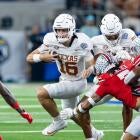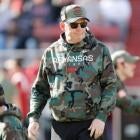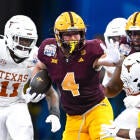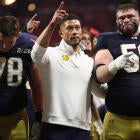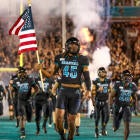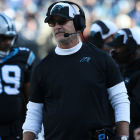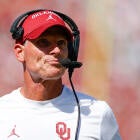
Had you polled a few Michigan faithful in the swirl of maize-and-blue confetti the night of the national championship game as to who would line up under center for the Wolverines in 2024, you would have gotten a variety of answers.
"Come back, J.J.!," the most hopeful of Michigan supporters would have pleaded. McCarthy would not, instead becoming a first-round pick of the Minnesota Vikings.
"Orji time," most would have said, referring to then-backup Alex Orji.
"Maybe a transfer," a handful might have wondered, though the pool of available talent was running dry.
Nobody would have guessed "Davis Warren," though as we know now, Warren would indeed be the quarterback to take Michigan's first snap as reigning national champions. He started again the next week in a top 10 showdown against Texas.
The former walk-on, who has an incredible story as a cancer survivor, has thrown for 322 yards and two touchdowns against three interceptions. Michigan is 1-1 following a blowout loss to the Longhorns with an offense that ranks 111th nationally in yards per play. Its lack of a passing attack has bogged down a running game that used to be fierce; the Wolverines do not have a rushing score through two games.
So, how did Michigan get here? How are the Wolverines, one of the biggest brands in the game and winners of three straight Big Ten titles, stuck with such an uninspiring quarterback room in an era in which 60-plus percent of Power Four starters have transferred at least once in their careers?
Talking to sources in and around the program, this is the series of events that led to a quarterback quandary that shows little sign of resolution as Michigan crawls toward Big Ten play:
Winter transfer portal window
Were Michigan to have gone in another direction at quarterback, it made the most sense to do so in the winter. Twenty-three of the top 25 quarterbacks in 247Sports' transfer portal rankings were entries during a window that runs from Dec. 4 to Jan. 2, with exceptions for teams participating in a postseason game after those dates.
The problems for Michigan in adding a quarterback were twofold at that time:
1. Jim Harbaugh's public courting by NFL teams did Michigan no favors. The Wolverines won the national championship on January 8. The Los Angeles Chargers didn't hire Jim Harbaugh until Jan. 24. The Wolverines promoted Sherrone Moore to head coach on Jan. 26. That's more than two weeks in basically no-man's land for Michigan, which is an eternity when it comes to a portal recruiting schedule set around the academic calendar; most schools were already underway with spring classes when Harbaugh made his move official.
Harbaugh's back-and-forth with the NFL helped the Wolverines in a way. Michigan's players couldn't easily leave and enroll elsewhere for the spring. But it also prevented the Wolverines from recruiting any high-level QBs.
After all, what top transfer QB would pick a school without knowing who the head coach and coordinators would be? It doesn't happen. Yes, there would have been some quarterbacks interested in Michigan. And there indeed were. But the timing made it nearly impossible for a marriage to occur..
Plus, on top of the Harbaugh issue, there was also McCarthy's status to consider. There was at least a hopeful thought for some around Michigan that McCarthy might come back for his senior year. He would end up declaring for the draft until Jan. 14.
2. It would have been difficult for Michigan to put together the money for a top-level QB with so many unknowns atop the program. Transfer quarterbacks don't come cheap; several top options this cycle commanded around $1 million a year, per multiple sources. CBS Sports' John Talty detailed earlier this offseason that a quality starting QB on the Power Four level warrants anywhere from $500,000 to $800,000 a season.
That's a big investment and ask of Michigan's donor base fresh off a national championship, especially as Harbaugh's status hung over everything.
Plus, Michigan runs NIL differently than a lot of other top programs, especially so under Harbaugh. Most of Michigan's money went to proven, long-time program players. The Wolverines rarely spent big in the portal. The infrastructure wasn't built to do so. Throw in an administration and a donor base that isn't quite as aggressive with funneling money toward NIL than some blueblood programs, and the timing didn't line up for Michigan to swing big at a quarterback.
Spring transfer portal window
A different time of year, a slightly different story.
The spring portal window isn't an oasis of starting quarterback talent. There were very few schools looking for starting-level QBs in the spring, and the market generally did not bear fruit. The two top 25 passers who did enter (Jaden Rashada, Dermaricus Davis) did so having played a combined three games in their careers.
Still, some around the Michigan program felt the right guy would be out there if the Wolverines made it known they wanted a QB. But not everyone in the program felt that would be necessary. There was a sense from some that Michigan's quarterback room, which featured Warren, Orji and seventh-year senior Jack Tuttle, would be good enough for Michigan to win at a level the program had grown accustomed to.
That's the side of the building that won out.
Orji showed a measure of improvement in the spring as a passer. Warren, who went 6-for-9 with 136 yards and two touchdowns in the spring game, continued to flash. Meanwhile, there was hope that Tuttle, who missed all of spring with an injury, would be back healthy in time for fall camp after serving as McCarthy's backup the season prior.
To that point, Orji had thrown one college pass and Warren none. Tuttle is a former starter at Indiana and brought a veteran arm to a room that otherwise lacked experienced options.
With the combination of those three -- one with immense upside as an athlete (Orji), one rising former walk-on with a lot of belief in the program (Warren) and an experienced player who's won ball games in the Big Ten before (Tuttle) -- the Wolverines felt they had enough to win.
Fall camp
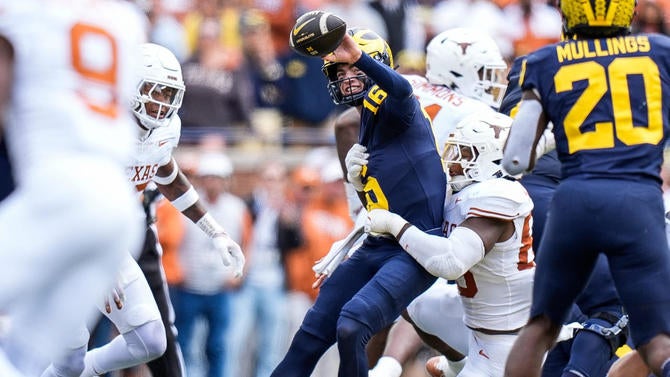
The story of Warren winning the job in August is reasonably well-told to this point.
Warren had a strong fall camp, pushing for more and more No. 1 reps as the days fell away in the lead-up to Fresno State. Meanwhile, Orji struggled -- especially down the stretch.
There had been a hope things would click for Orji, who is immensely gifted as a runner. Had he taken a needed leap as a passer, Michigan was expecting to have one of the most dangerous quarterbacks in college football. But Orji simply did not show enough to beat out Warren. Orji played against both Fresno State and Texas but he's only thrown two passes to this point.
Tuttle could have potentially changed the equation at quarterback. But he's yet to appear in a game for the Wolverines this year as he continues to recover from an offseason surgery.
High school QB recruiting in focus
Most of the focus with Michigan's quarterback situation centers around the transfer portal. But it's worth taking a look at the Wolverines' quarterback takes between J.J. McCarthy in the 2021 class and Jadyn Davis, a four-star prospect in the 2024 class:
- Jayden Denegal, 2022 class: Denegal ranked as the No. 19 overall quarterback in the country during the 2022 cycle and hasn't been a big part of Michigan's QB battle this offseason.
- Alex Orji, 2022 class: Orji ranked as the No. 50 overall quarterback in the country in 2022. He's an incredible athlete but was considered a developmental passer who completed 49% of his passes as a high school senior.
- Kendrick Bell, 2023 class: Bell ranked as the No. 95 overall athlete in the 2023 cycle. He's already made the move to wide receiver and actually started against Texas.
Perhaps it's still too early to say whether those three end up being big misses for Michigan -- and by the way, the 2022 crop of quarterbacks a whole has struggled. But the early returns aren't encouraging. Throw in some QBs that Michigan could have had during that time -- 2023 five-star Dante Moore is from Detroit and ended up at UCLA before transferring to Oregon -- and Michigan's run of high school recruiting between McCarthy and Davis leaves a lot to be desired, especially for a team that won multiple Big Ten titles in that stretch. We'd need time for a separate conversation on the lack of perimeter passing options for Michigan; a story for another day.
Those misses, both in development and recruiting, are a big reason Michigan is stuck in this situation. The Wolverines have found a ton of success with their other evaluations during that period -- the 2022 and 2023 classes helped Michigan win a national championship -- but the inability to produce a QB has made the post-McCarthy era feel rather bleak.
What's next for Michigan at QB?
That's still a developing situation. One advantage for Michigan is they didn't spend big money on a quarterback in the offseason, so they're not locked into a struggling starter like you'll see at some other blueblood programs this year. The Wolverines can pivot.
Warren could get better. Orji could take the job. Tuttle could change the complexion of the room if he gets healthy. Maybe Davis emerges as the program's next guy. There's a lot of football left to be played over the next 10 weeks. Michigan hasn't even hit Big Ten play; USC comes to Ann Arbor on Sept. 21 to open that part of the schedule.
Either way, Michigan's QB situation, fresh off a national championship, will be an interesting case study for the future. It's certainly something nobody would have seen coming on Jan. 8 when all that confetti fell.
MORE: Michigan expert Sam Webb's three things he thinks, three things he knows after UM's Texas loss
![[object Object] Logo](https://sportshub.cbsistatic.com/i/2020/04/22/e9ceb731-8b3f-4c60-98fe-090ab66a2997/screen-shot-2020-04-22-at-11-04-56-am.png)









